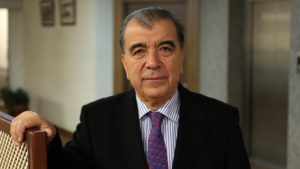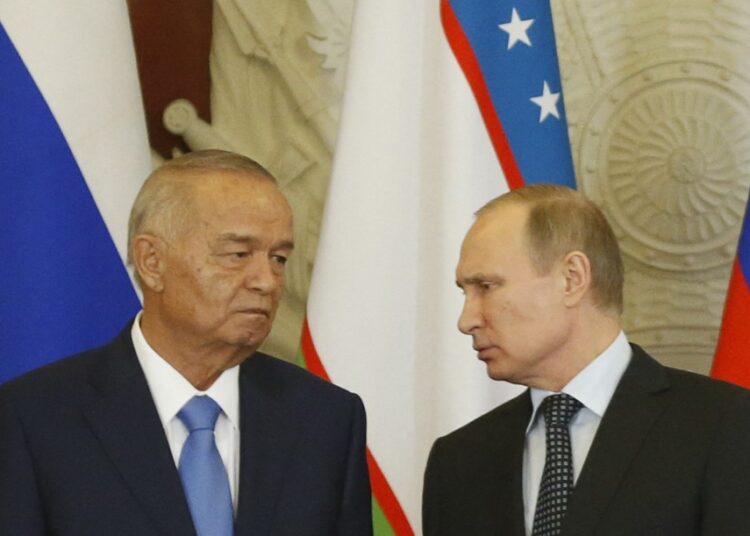Islam Karimov, the late president of Uzbekistan, had passed confidential information to Turkey when he was serving as a member of the Political Bureau of the Central Committee of the Communist Party of the Soviet Union (Politburo), the Soviet Union’s highest decision making body, between 1990 and 1991.
According to official Turkish documents obtained by Nordic Monitor, Karimov’s secret mission at the Politburo was revealed In February by a former Turkish intelligence officer who worked as a trusted go-between for Karimov and the Turkish leadership.
Testifying in court on February 14 in Ankara, Enver Altaylı, a veteran intelligence officer who had worked for Turkey’s National Intelligence Organization (MIT) in the ’60s and ’70s, said he had secretly carried messages from Karimov to Turkish leaders about discussions that took place at the Politburo.
“Until the end of 1991, before going to every Politburo meeting, he [Karimov] would talk to me and say, ‘Enver, my brother, talk to Turgut [Özal] and Süleyman [Demirel] … to see if there’s anything in particular they want to know [about the meeting]’,” he told the court. At the time Özal was president and Demirel was his prime minister.
This means he had spied for Turkey by informing the Turkish president during the Cold War era, Altaylı said, highlighting the significance of passing top secret information to Turkey, a member of NATO. He said Karimov was wiling to share sensitive information because of his Turkic roots.
Only a few people knew about this secret channel between Turkish President Özal and Karimov, and Turkish intelligence agency MIT was kept out of the loop for fear of a leak and possible infiltration of MIT by Russian spies. If the Russians had learned about this, they would have assassinated Karimov, Altaylı said.
It turned out that the decision to keep MIT out of this highly sensitive cooperation was a wise one. MIT was run at the time by Şenkal Atasagun, an ultranationalist known for his anti-Western views. A confidential report prepared on Altaylı and presented to Karimov by the Russians, who were uneasy about his engagement in Central Asia on behalf of Turkey, was similar to one prepared by Atasagun, who asked the Uzbek leader to stop working with Altaylı. He said Karimov shared both reports with him to reveal a joint plot against him and noted that this confirmed they had made the right decision to keep MIT out of the secret channel between Turkey and Uzbekistan.
“We did the right thing by doing this business only with you, Mr. Süleyman and Mr. Turgut,” Karimov told Altaylı.
Seventy-nine-year-old Altaylı left MIT in the ’80s and worked in the private sector, at times serving as an advisor to Özal and Demirel, and played an important role in shaping Turkey’s foreign policy with respect to Russia and Central Asia in the aftermath of the collapse of the Soviet Union.

Altaylı was arrested in 2017 for alleged membership in the Gülen movement, a group critical of President Recep Tayyip Erdogan, although he is not known as a Gülenist. He was charged with “political and military espionage” as well. At the end of his trial in November 2021, he was handed down a prison sentence of more than 23 years.
In Altaylı’s indictment, filed in January 2020 by loyalist prosecutor Muhammet Ali Korkmaz, Altaylı’s views that Turkey, the US and Israel should form an alliance to pursue their common interests were cited as evidence of a crime.
Altaylı believes he was targeted by the Erdogan government and its ally, a pro-Russian, neo-nationalist group, because he took a stand against the Federal Security Service of the Russian Federation (FSB), formerly known as the KGB. According to Altaylı, forces and individuals close to Russia in Turkey tried to silence him by throwing him in prison, and the slurs and negative publications about him, especially in pro-government outlets, should be evaluated within this framework.
Karimov, who served as chair of the Uzbek Communist Party starting in 1989, became head of state in 1991 after Uzbekistan declared its independence and ruled the country with iron fist until his death in September 2016. During his tenure, Uzbekistan’s ties with Turkey were chilly for the most part, with signs of a thaw in relations towards the end of his time in office.
By: Abdullah Bozkurt
Source: Nordic Monitor



